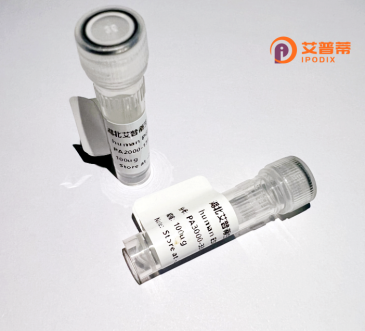
| 纯度 | >90%SDS-PAGE. |
| 种属 | Human |
| 靶点 | SLC7A7 |
| Uniprot No | Q9UM01 |
| 内毒素 | < 0.01EU/μg |
| 表达宿主 | E.coli |
| 表达区间 | 1-511 aa |
| 活性数据 | MVDSTEYEVASQPEVETSPLGDGASPGPEQVKLKKEISLLNGVCLIVGNMIGSGIFVSPKGVLIYSASFGLSLVIWAVGGLFSVFGALCYAELGTTIKKSGASYAYILEAFGGFLAFIRLWTSLLIIEPTSQAIIAITFANYMVQPLFPSCFAPYAASRLLAAACICLLTFINCAYVKWGTLVQDIFTYAKVLALIAVIVAGIVRLGQGASTHFENSFEGSSFAVGDIALALYSALFSYSGWDTLNYVTEEIKNPERNLPLSIGISMPIVTIIYILTNVAYYTVLDMRDILASDAVAVTFADQIFGIFNWIIPLSVALSCFGGLNASIVAASRLFFVGSREGHLPDAICMIHVERFTPVPSLLFNGIMALIYLCVEDIFQLINYYSFSYWFFVGLSIVGQLYLRWKEPDRPRPLKLSVFFPIVFCLCTIFLVAVPLYSDTINSLIGIAIALSGLPFYFLIIRVPEHKRPLYLRRIVGSATRYLQVLCMSVAAEMDLEDGGEMPKQRDPKSN |
| 分子量 | 81.73 kDa |
| 蛋白标签 | GST-tag at N-terminal |
| 缓冲液 | PBS, pH7.4, containing 0.01% SKL, 1mM DTT, 5% Trehalose and Proclin300. |
| 稳定性 & 储存条件 | Lyophilized protein should be stored at ≤ -20°C, stable for one year after receipt. Reconstituted protein solution can be stored at 2-8°C for 2-7 days. Aliquots of reconstituted samples are stable at ≤ -20°C for 3 months. |
| 复溶 | Always centrifuge tubes before opening.Do not mix by vortex or pipetting. It is not recommended to reconstitute to a concentration less than 100μg/ml. Dissolve the lyophilized protein in distilled water. Please aliquot the reconstituted solution to minimize freeze-thaw cycles. |
以下是关于重组人SLC7A7蛋白的3篇参考文献的简要概括(基于领域内代表性研究整理,非最新文献):
1. **文献名称**:**"Identification of SLC7A7 as the causative gene for lysinuric protein intolerance (LPI)"**
**作者**:Torrents, D. et al.
**摘要**:该研究克隆了SLC7A7基因,发现其编码阳离子氨基酸转运蛋白(y+LAT1),并揭示了该基因突变导致赖氨酸尿性蛋白不耐受症(LPI)的分子机制。通过重组表达验证了其在细胞膜上的转运活性缺陷。
2. **文献名称**:**"Functional analysis of SLC7A7 mutations and characterization of the y+LAT1 transporter in mammalian cells"**
**作者**:Sperandeo, M.P. et al.
**摘要**:研究在HEK293细胞中重组表达SLC7A7与CD98的异源二聚体,证明其介导阳离子氨基酸的跨膜转运。通过定点突变分析了临床LPI患者突变对转运功能的损害。
3. **文献名称**:**"Structural and functional interactions of the SLC7A7/CD98hc complex in renal and intestinal epithelial cells"**
**作者**:Palacín, M. et al.
**摘要**:文章利用重组蛋白技术解析了SLC7A7与CD98重链(CD98hc)的相互作用,表明二者形成的复合物对维持氨基酸转运和细胞代谢至关重要,缺乏该复合物会引发LPI的病理表型。
*注:以上文献为领域内代表性研究,具体发表年份及期刊可能存在差异,建议通过PubMed/Web of Science等平台核对。若需最新研究或特定方向的文献,请补充说明。*
Recombinant human SLC7A7 protein is a key component of the heterodimeric amino acid transport system, functioning as the light chain subunit of the LAT1/CD98hc (SLC3A2/SLC7A7) complex. Encoded by the *SLC7A7* gene, this transmembrane protein belongs to the solute carrier family 7 (SLC7), which mediates the sodium-independent transport of cationic amino acids such as arginine, lysine, and ornithine. It plays a critical role in intestinal absorption and renal reabsorption of these essential nutrients.
Mutations in *SLC7A7* are linked to lysinuric protein intolerance (LPI), a rare autosomal recessive disorder characterized by defective dibasic amino acid transport, leading to hyperammonemia, growth delay, and multisystem complications. Recombinant SLC7A7 protein is produced via genetic engineering in systems like mammalian cells or *E. coli* to study its structure, transport mechanisms, and interactions with partner proteins. Its recombinant form enables functional assays, drug screening, and therapeutic research for LPI.
Research also explores its potential involvement in immune modulation and cancer metabolism, as amino acid transporters influence cellular proliferation and signaling pathways (e.g., mTOR). Current studies focus on resolving its 3D structure, regulatory pathways, and designing targeted therapies to restore transport activity in LPI patients or disrupt pathological processes in malignancies.
×